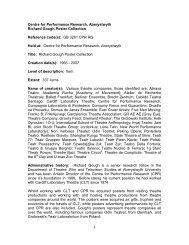MSc Equine Science - Aberystwyth University
MSc Equine Science - Aberystwyth University
MSc Equine Science - Aberystwyth University
Create successful ePaper yourself
Turn your PDF publications into a flip-book with our unique Google optimized e-Paper software.
<strong>MSc</strong> <strong>Equine</strong><br />
<strong>Science</strong><br />
Candidate’s Guide<br />
www.aber.ac.uk/en/ibers<br />
Interested in a career in <strong>Equine</strong> <strong>Science</strong>?<br />
Want to get that one step ahead in the job market?<br />
This <strong>MSc</strong> could be your passport to success.
<strong>MSc</strong> LivEStock SciEncE<br />
Candidate’s Guide to Taught<br />
Postgraduate Studies in <strong>Equine</strong> <strong>Science</strong><br />
Contents<br />
Introduction .......................................................1<br />
<strong>Equine</strong> Studies at <strong>Aberystwyth</strong> .....................................1<br />
Careers ............................................................2<br />
Scholarship ........................................................2<br />
Facilities ...........................................................2<br />
The Courses<br />
Content ...........................................................3<br />
<strong>MSc</strong> <strong>Equine</strong> <strong>Science</strong> ................................................3<br />
The Modules<br />
Semester 1. . . . . . . . . . . . . . . . . . . . . . . . . . . . . . . . . . . . . . . . . . . . . . . . . . . . . . . . .4<br />
Semester 1 + 2 .....................................................5<br />
Semester 2. . . . . . . . . . . . . . . . . . . . . . . . . . . . . . . . . . . . . . . . . . . . . . . . . . . . . . . . .6<br />
Post Graduate Diploma <strong>Equine</strong> <strong>Science</strong> .............................8<br />
Post Graduate Certificates ..........................................8<br />
Post Graduate Certificate <strong>Equine</strong> Nutrition ..........................8<br />
Post Graduate Certificate <strong>Equine</strong> Reproduction and Stud Managment . . . .8<br />
Study Tours ........................................................9<br />
Conferences .......................................................9<br />
The <strong>Equine</strong> <strong>Science</strong> Course Team ................................. 10<br />
Other Lecturing Staff ............................................. 10<br />
Abi<br />
BSc <strong>Equine</strong> <strong>Science</strong>, <strong>MSc</strong> <strong>Equine</strong> <strong>Science</strong><br />
PhD Student <strong>University</strong> of Nottingham Veterinary<br />
School<br />
After having been involved with horses all my life I<br />
was aware of all the conflicting tales regarding their management.<br />
I decided I wanted a solid scientific base on which to form my own<br />
opinions about equine husbandry and chose <strong>Aberystwyth</strong> as the<br />
place to do this. I was impressed by their facilities and being able<br />
to take my own horse there was a definite bonus.<br />
The <strong>MSc</strong> course covered a good range of topics and all the staff<br />
helped encourage me to think in a scientific manner. The excellent<br />
contacts which Aber has with other research institutions allowed<br />
me to carry out my dissertation research at the <strong>University</strong> of<br />
Liverpool veterinary hospital into bacterial biofilms in equine<br />
wounds.<br />
I decided that improving equine welfare through research would<br />
be a challenging and exciting<br />
progression for my career so<br />
I applied for a PhD at the<br />
<strong>University</strong> of Nottingham<br />
Veterinary School studying<br />
laminitis and osteoarthritis<br />
in horses. The excellent<br />
scientific base that Aber<br />
gave me, has enabled me<br />
to confidently tackle the<br />
challenges of a PhD.
Introduction<br />
This booklet is designed to help you to make the<br />
best choice of course and place for your post<br />
graduate study. Its aim is to give you a flavour of<br />
the taught Postgraduate equine courses we offer<br />
here at <strong>Aberystwyth</strong>, in particular the <strong>MSc</strong> <strong>Equine</strong><br />
<strong>Science</strong>. We hope you like what you see in this<br />
guide, if so you can apply on line via the <strong>University</strong><br />
web site (www.aber.ac.uk/en/postgrad/apply), or via<br />
contacting Dr Mina Davies-Morel, the PG Schemes<br />
Director, (mid@aber.ac.uk) for further advice, and<br />
paper copies of the required application materials.<br />
UK gold medal winning team at the student riding nations cup in Germany,<br />
Bea Meitiner <strong>MSc</strong> <strong>Equine</strong> <strong>Science</strong> student far left<br />
<strong>Equine</strong> Studies at <strong>Aberystwyth</strong><br />
<strong>MSc</strong> EquinE SciEncE 1<br />
<strong>MSc</strong>, Postgraduate Diploma and Postgraduate Certificates<br />
What makes <strong>Aberystwyth</strong> and our post graduate equine<br />
courses unique? What can we offer that other places cannot?<br />
As the longest provider of equine-related higher education in<br />
the United Kingdom we have a longstanding, well respected<br />
reputation for high quality teaching. We are also in the unique<br />
position of being the only traditional <strong>University</strong> running a<br />
portfolio of equine courses up to and including, postgraduate<br />
research level.<br />
We feel strongly that if you are to experience a true post<br />
graduate learning environment and gain a meaningful post<br />
graduate qualification you need to study in a research lead<br />
environment of international renown. <strong>Equine</strong> research plays a<br />
strong role within the Institute’s portfolio, so as a student of one<br />
of our post graduate courses you will benefit from this and be<br />
assured that you will only be taught by staff who are research<br />
active and regularly publish internationally. This ensures that you<br />
benefit from a true post graduate teaching experience.<br />
<strong>Aberystwyth</strong> provides a superb location for learning and<br />
leisure in a wide range of areas with a vibrant international<br />
post graduate community. <strong>Aberystwyth</strong> is a particularly ideal<br />
environment for studying equine studies/science with superb<br />
equine facilities for learning, research, livery and enjoyment. The<br />
<strong>Equine</strong> Centre offers modern purpose-built teaching, research<br />
and learning facilities which are also within easy reach of the<br />
open riding country and the 5 miles of sandy beach at Borth.<br />
In addition to the <strong>MSc</strong>, Postgraduate Diploma, and Postgraduate<br />
Certificates, the Institute also runs a BSc in <strong>Equine</strong> <strong>Science</strong>, BSc<br />
<strong>Equine</strong> Studies, Foundation Degree in <strong>Equine</strong> Studies, <strong>MSc</strong><br />
Animal <strong>Science</strong>, <strong>MSc</strong> Livestock <strong>Science</strong> and has several students<br />
studying for MPhil. and PhDs in various areas of equine studies.<br />
Our classification as a British Horse Society (BHS) ‘Where to train<br />
facility’ also means that students have the opportunity to train<br />
in Horse Care and Equitation from Stage One, through to full<br />
Instructor Certificate.
2<br />
<strong>MSc</strong> EquinE SciEncE<br />
Careers<br />
The rapid increase in the worldwide leisure and sport horse<br />
population has led to the demand for personnel who have the<br />
scientific and technical training to work at an advanced level<br />
within this expanding industry. Our equine postgraduate courses<br />
have been designed to meet this demand.<br />
We are the longest established provider of equine-related higher<br />
education in the United Kingdom. The <strong>University</strong> has been<br />
teaching postgraduate courses in <strong>Equine</strong> Studies/<strong>Science</strong> since<br />
the 1970’s, in particular our world renowned <strong>MSc</strong>. An <strong>MSc</strong> <strong>Equine</strong><br />
<strong>Science</strong> from <strong>Aberystwyth</strong> has proved over the years to be a<br />
valuable, well respected qualification which has, and continues<br />
to, open the door to a whole host of exciting opportunities<br />
to graduates over the last 35 years. We are very proud of the<br />
employment record of our students which has always been<br />
excellent, many graduates holding exciting positions in the<br />
many facets of the equine industry, in particular senior positions<br />
in <strong>University</strong>/College lecturing and management, research<br />
establishments, commercial companies, advisory positions,<br />
administrative posts, retail industry, journalism etc. As with<br />
many postgraduate qualifications, the course will also allow<br />
you to pursue a whole host of careers in other related and<br />
unrelated disciplines, where a post graduate qualification leads<br />
to accelerated promotion and greater opportunities.<br />
Scholarship<br />
As a department we offer a number of scholarships per year,<br />
to students studying our equine-related postgraduate courses.<br />
Scholarships are kindly sponsored by the Masons and the<br />
<strong>University</strong>. Details on how to apply for the scholarships can be<br />
obtained from Dr Mina Davies Morel or discussed at interview.<br />
Decisions on the recipients of awards are made during the Easter<br />
vacation prior to the September of entry. Further support is<br />
also given by a whole host of other Universities and research<br />
establishments throughout the U.K. and overseas through<br />
the provision of placements for dissertation research, visiting<br />
lectures etc.<br />
Facilities<br />
Horse walker at Lluest <strong>Equine</strong> Research Centre<br />
In addition to the excellent teaching, training and social facilities<br />
that you should rightly expect of a well established, traditional<br />
<strong>University</strong>, the Institute also has an equine teaching and DIY<br />
yard, a dedicated equine research facility, providing plenty of<br />
opportunity for research projects plus a number of farms and 2<br />
field research stations. The equine facilities provide a Home Office<br />
standard research yard, international sized indoor school, outdoor<br />
all-weather manèges, cross-country course, stabling for some 70<br />
horses, foaling boxes, round pen, horse walker, demonstration/<br />
veterinary inspection areas, associated tack and feed rooms, plus<br />
in excess of 50 acres of land. DIY livery facilities allow you to bring<br />
your own horse if you wish. These facilities provide you with plenty<br />
of opportunities outside your formal teaching to be involved with<br />
many equine activities, university riding teams, competitions,<br />
demonstrations, lectures etc.
The Course<br />
Content<br />
The postgraduate courses in <strong>Equine</strong> <strong>Science</strong> are advanced<br />
scientific courses reflecting the Institute’s expertise and areas of<br />
research.<br />
The courses are all made up of a varying number of taught<br />
modules plus staff guided independent student centred<br />
study. This provides a framework which allows you to develop<br />
your subject knowledge, through pursuing specific areas of<br />
interest, and develop your skills of original thought, analysis,<br />
interpretation and reasoning. The <strong>University</strong>’s excellent library<br />
and information retrieval system and the close proximity of<br />
the National Library of Wales facilitates your whole learning<br />
experience.<br />
All post graduate courses are delivered via lectures, seminars,<br />
demonstrations, visits and practicals. Several of the modules will<br />
include the study of dissection material. Your performance is<br />
graded through course work and final examinations.<br />
Pregnancy detection in the mare using ultrasound<br />
Msc <strong>Equine</strong> <strong>Science</strong><br />
<strong>MSc</strong> EquinE SciEncE 3<br />
The <strong>MSc</strong> <strong>Equine</strong> <strong>Science</strong> is one of the main post graduate courses<br />
run by the Institute and provides the basis for the other post<br />
graduate equine courses. The <strong>MSc</strong> <strong>Equine</strong> <strong>Science</strong> runs along<br />
side the <strong>MSc</strong> Animal <strong>Science</strong> and <strong>MSc</strong> Livestock <strong>Science</strong>. The <strong>MSc</strong><br />
is a modularised course and can be studied either on a full or<br />
part-time basis.<br />
Full Time<br />
The full-time course is 12 months in duration, running from<br />
September to September. The course comprises of two taught<br />
semesters (14 weeks) and three months dissertation work.<br />
The course is delivered in a modular format with 60 credits<br />
per semester. Dissertations are commenced after successful<br />
completion of the taught modules and have to be submitted<br />
within 14 months of your commencement of the course.<br />
Part Time<br />
The part-time option is identical to the full-time course but the<br />
taught element is extended over 2 years (30 credits/semester),<br />
it may be arranged so that attendance at <strong>University</strong> is only for 1<br />
day/week during term time (22 weeks). Dissertations may then<br />
be submitted within three years of commencement of<br />
the course.
4<br />
<strong>MSc</strong> EquinE SciEncE<br />
The Modules<br />
Progression to the dissertation for the award of<br />
<strong>MSc</strong> on both the full-time and part-time route is<br />
dependent on you successfully completing the<br />
following taught modules:<br />
Semester 1<br />
Immunology, Parasitology and Bacteriology (20 credits)<br />
In this module you will consider in detail animal immunology,<br />
parasitology and bacteriology. Molecular, cellular and<br />
organic components of the immune system will be outlined.<br />
Immunological aspects of reproduction, development and<br />
ageing will be discussed, along with a variety of immunological<br />
malfunctions and manipulations. The principles of integrated<br />
programmes for the control of parasites will be considered and<br />
applied to the use of appropriate anthelmintics. The isolation and<br />
identification of bacteria will be studied along with the means<br />
by which such bacteria are able to cause disease. This knowledge<br />
will then be applied to the principles of diagnosis and treatment<br />
of such disease<br />
Animal Breeding and Genetics (10 credits)<br />
In this module you will consider the potential for genetic<br />
improvement of domestic animals for economic traits. Starting<br />
with an overview of the principles of Mendelian inheritance<br />
applied to coat colour, disease and polymorphisms suitable for<br />
parentage testing, this course advances to a discussion of the<br />
effects inbreeding and heterosis. The principles of quantitative<br />
genetics are outlined and their application to the improvement<br />
of horses for leisure, racing, jumping, dressage, and the<br />
productivity of farm livestock are discussed. Recent advances in<br />
molecular genetics and their application to animal improvement<br />
are considered.<br />
Principles of Nutrition (10 credits)<br />
In this module you will consider in detail the principles of animal<br />
nutrition. The evaluation of feeds in a laboratory and field<br />
context will be discussed as will principles of energy and protein<br />
metabolism and nutrition. The consequences and possible<br />
causes of mineral and vitamin deficiencies and excesses will be<br />
considered. This knowledge will then be applied to develop an<br />
understanding of ration formulation.<br />
Lee-Ann<br />
HND <strong>Equine</strong> Studies,<br />
BSc <strong>Equine</strong> <strong>Science</strong>, <strong>MSc</strong> <strong>Equine</strong> <strong>Science</strong><br />
<strong>Equine</strong> <strong>Science</strong> Lecturer, Abingdon and Witney College.<br />
Course leader Foundation Degree <strong>Equine</strong> <strong>Science</strong> and<br />
Management.<br />
I chose <strong>Aberystwyth</strong> initially to study the HND and eventually<br />
completed my studies 5 years later with the BSc (Hons) and<br />
<strong>MSc</strong>. The university’s reputation as an excellent institute is<br />
widely acknowledged. The <strong>MSc</strong> programme combines up-todate<br />
scientific teaching by lecturers with extensive research<br />
backgrounds with a valuable dissertation project.<br />
I thoroughly enjoyed studying the <strong>MSc</strong> at Aber. As well as<br />
providing me with a vast quantity of scientific knowledge<br />
it taught me how to write scientifically, how to research<br />
thoroughly, how to give seminars successfully and how to<br />
manage my time effectively. Aber provides an interesting and<br />
challenging course that is highly regarded in the industry.<br />
Since graduating from Aber I moved straight into teaching.<br />
I currently lecture on 3 courses, of varying levels, including<br />
nutrition, genetics and reproductive physiology. Alongside<br />
lecturing I am completing a teaching qualification as well<br />
as collaborating on research projects with Oxford Brookes<br />
<strong>University</strong>. The <strong>MSc</strong> at Aber has been invaluable<br />
at preparing me for my chosen career.<br />
Lecturing on the BSc, FDSc and<br />
ND equine courses
Endocrinology, Growth and development (10 credits)<br />
This module will consider the patterns of growth and<br />
development of the live weight, carcass tissues and major organs<br />
of animals. The effects of breed, sex, nutrition and exercise are<br />
considered. Subsequently, the role of growth hormone and the<br />
IGF family of proteins in growth and lactation will be discussed.<br />
Control of feed intake and the regulation of body adiposity will<br />
also be examined.<br />
Reproductive Physiology (10 credits)<br />
In this module you will consider in detail the gross and<br />
microscopic functional anatomy of the reproductive systems of<br />
both horses and farm livestock. Embryology and placentation<br />
will be covered in detail along with the endocrine control<br />
mechanisms that govern all aspects of reproductive function in<br />
both the male and female. Lactation, its anatomy, physiology and<br />
function will also be detailed.<br />
Semester 2<br />
Statistics for Experimental Scientists (10 credits)<br />
This module will be delivered via e learning with tutorial support.<br />
The module will cover basic quantitative statistics which will<br />
then be developed on to more complex statistical procedures<br />
including multifactorial ANOVA, multivariate analyses and<br />
aspects of experimental design relevant to large animals<br />
investigations.<br />
Advances in <strong>Equine</strong> and Livestock <strong>Science</strong>s (10 credits)<br />
The scope of this module is intentionally broad so that it can<br />
take full advantage of the ongoing research of the <strong>University</strong><br />
and its visitors. The module will have a short series of lectures on<br />
advances in equine and livestock. These lectures will be delivered<br />
by leading research scientists within their field and will draw<br />
on scientists working in <strong>Aberystwyth</strong> <strong>University</strong> plus visiting<br />
specialists. Following this, students will be required to present<br />
seminars on a topic within their specific field.<br />
<strong>MSc</strong> EquinE SciEncE 5<br />
Julie<br />
<strong>MSc</strong> <strong>Equine</strong> <strong>Science</strong><br />
PhD student, School of Veterinary Medicine, <strong>University</strong> of<br />
California, Davis. Current position Senior Scientist, Select<br />
Breeders Service, Colora, USA<br />
My PhD research, “The Effect of Oxidative<br />
Stress on <strong>Equine</strong> Sperm Function, Semen<br />
Storage and Stallion Fertility” was aimed at improving<br />
the success of artificial insemination using cryopreserved<br />
stallion spermatozoa, with a focus on counteracting the<br />
effect of reactive oxygen species by adding antioxidants<br />
to the freezing extender. I really enjoyed the <strong>MSc</strong> in<br />
<strong>Equine</strong> <strong>Science</strong>, it was fun to study something that I care<br />
so passionately about – the horse. The <strong>MSc</strong> has a scientific<br />
focus and enables a greater understanding of equine<br />
physiology, plus the opportunity to do research of your own.<br />
The course gave me a good understanding of equine<br />
reproduction and the research project gave me contacts<br />
here at UC Davis. If you are interested in a career in equine<br />
research, the <strong>MSc</strong> project is a valuable<br />
opportunity to work with experts in your<br />
chosen field – make the most of it.
6<br />
<strong>MSc</strong> EquinE SciEncE<br />
<strong>Equine</strong> Stud Management (10 credits)<br />
This module will apply the knowledge gained in the reproductive<br />
physiology module to equine breeding management. The use<br />
of reproductive technology and artificial manipulation will be<br />
evaluated in detail including the use of hormone therapies,<br />
embryo transfer, artificial insemination, ultrasonic scanning<br />
etc. Evaluation and detailed understanding of the factors<br />
affecting fertility and the selection of breeding stock based on<br />
reproductive competence will be included.<br />
<strong>Equine</strong> Anatomy (10 credits)<br />
This module will be presented as a lecture course with two fourhour<br />
dissections and one live horse practical (dependent on<br />
material available), and will be supported by a 2-day conference<br />
on exercise physiology at Gregynog. The module will consider<br />
classification and evolution of the equid. It will examine the<br />
evolution of the skeletal structure of the head, locomotory,<br />
cardiovascular and respiratory systems along with skeletal<br />
anatomy, muscle structure, and function specifically related to<br />
movement.<br />
<strong>Equine</strong> Nutrition (10 credits)<br />
In this module you will cover the scientific principals underlying<br />
good feeding practice, including relation to anatomy and<br />
physiology of the digestive tract. Ration formulation and critical<br />
analysis of dietary principals for different categories of horse will<br />
be explored (e.g. maintenance, working and breeding stock).<br />
Lectures will also include reviews and discussion of recent topical<br />
research, such as factors affecting gut motility and scientific<br />
techniques for estimating this, the inclusion of pro and prebiotics<br />
due to actions upon hindgut flora and fauna and dietrelated<br />
diseases<br />
<strong>Equine</strong> Behaviour (10 credits)<br />
This module focuses on the ontogeny of equine behaviour,<br />
behavioural motivation, the role of the senses, learning and<br />
abnormal behaviour. This will be developed on to the recognition<br />
of the major behavioural abnormalities in the domestic horse.<br />
Animal welfare issues including bioethics, behavioural needs,<br />
suffering, cruelty, stress and legislation will also be discussed.<br />
Claire<br />
<strong>MSc</strong> <strong>Equine</strong> <strong>Science</strong><br />
Graduate Research Assistant, <strong>Equine</strong> Grass<br />
Sickness Surveillance, Animal Health Trust.<br />
I decided to come to <strong>Aberystwyth</strong> <strong>University</strong> to do the<br />
<strong>MSc</strong> in <strong>Equine</strong> <strong>Science</strong>. I qualified from the Royal (Dick)<br />
School of Veterinary Studies, Edinburgh and was interested<br />
in studying horses further. I chose <strong>Aberystwyth</strong> as it has<br />
the longest established equine <strong>MSc</strong> in the UK, with an<br />
impressive reputation. I realised what a great place it could<br />
be to study and live when I came for my interview.<br />
For my <strong>MSc</strong> dissertation I undertook a study into risk factors<br />
for equine grass sickness which then led directly to my<br />
current job at the Animal Health Trust. I am now responsible<br />
for setting up the first nationwide surveillance scheme<br />
for equine grass sickness, using the skills and knowledge I<br />
acquired through<br />
the <strong>MSc</strong> course.<br />
I would thoroughly<br />
recommend<br />
doing a Masters<br />
at <strong>Aberystwyth</strong><br />
- not only is it a<br />
great qualification<br />
to have but it’s<br />
based in the ideal<br />
location to have<br />
the best year of<br />
your life. Don’t<br />
miss out!
Dissertation<br />
Progression to the dissertation for the award of <strong>MSc</strong> <strong>Equine</strong><br />
<strong>Science</strong> is dependent upon satisfactory performance in the<br />
modules in the taught part of the course.<br />
The dissertation is a great opportunity for you to study in<br />
significant detail an area that really interests you. Dissertations<br />
normally involve the generation and analysis of original research<br />
data, and its presentation in a thesis of 20,000 words. Ongoing<br />
research within the Institute provides plenty of opportunities for<br />
dissertation work. Alternatively many students choose to take<br />
advantage of our well established links with other Institutes and<br />
Veterinary/Animal <strong>Science</strong> Departments in the UK and abroad<br />
and carry out their research elsewhere. A great opportunity<br />
especially if you want to pursue a research career.<br />
Computer analysis of equine movement<br />
<strong>MSc</strong> EquinE SciEncE 7<br />
Sian<br />
BSc <strong>Equine</strong> <strong>Science</strong>, <strong>MSc</strong> <strong>Equine</strong> <strong>Science</strong><br />
PhD Student, Royal Veterinary College, London.<br />
I have always had an interest in horses, and<br />
accordingly decided to study <strong>Equine</strong> <strong>Science</strong> at <strong>Aberystwyth</strong><br />
<strong>University</strong>. During my BSc I developed an interest in equine<br />
reproductive biology. I went on to study equine science at<br />
<strong>MSc</strong> level to further develop this interest, and was able to<br />
undertake my <strong>MSc</strong> dissertation on Assisted Reproduction at<br />
Vienna Vet School.<br />
The Masters course was<br />
thoroughly enjoyable and<br />
interesting, with sufficient<br />
flexibility to allow students<br />
to focus their interests.<br />
The course helped me to<br />
develop skills which have<br />
assisted me in my current<br />
position as PhD student,<br />
studying cell culture<br />
techniques as models for<br />
uterine infections in women<br />
and cattle.<br />
Stud visit to Dalham Hall Stud (Darley International)
8<br />
<strong>MSc</strong> EquinE SciEncE<br />
Post Graduate Diploma <strong>Equine</strong> <strong>Science</strong><br />
On successful completion of the taught part of the <strong>MSc</strong>, students<br />
are eligible to be awarded a Post Graduate Diploma in <strong>Equine</strong><br />
<strong>Science</strong>. Most students choose to go on and complete their<br />
dissertation, but if for any reason they do not wish to do so,<br />
they can leave with a Post Graduate Diploma. The Post Graduate<br />
Diploma may also be studied in its own right.<br />
Post Graduate Certificates<br />
We offer 2 Post Graduate Certificates on a part-time basis, which<br />
are based upon the <strong>MSc</strong> modules detailed previously. These Post<br />
Graduate Certificates each consist of 60 credits, with attendance<br />
at <strong>University</strong> for 1 day per week (24 weeks). Their main aim is<br />
to provide greater flexibility for your study, especially if you<br />
are continuing to pursue your career while studying. They also<br />
enable you to accumulate, over time, certificates and modules<br />
towards the award of Post Graduate Diploma and ultimately <strong>MSc</strong><br />
<strong>Equine</strong> <strong>Science</strong>.<br />
Post Graduate Certificate <strong>Equine</strong> Nutrition<br />
This Certificate includes the following modules:<br />
• Principles of Nutrition<br />
• <strong>Equine</strong> nutrition<br />
• <strong>Equine</strong> Anatomy<br />
• Emerging Veterinary <strong>Science</strong><br />
• Literature Review – a 10,000 word literature based<br />
dissertation on a specific area of <strong>Equine</strong> Nutrition<br />
Post Graduate Certificate <strong>Equine</strong><br />
Reproduction And Stud Management<br />
This Certificate includes the following modules:<br />
• <strong>Equine</strong> Reproductive Physiology and Technology<br />
• <strong>Equine</strong> Anatomy<br />
• Emerging Veterinary <strong>Science</strong><br />
• Literature Review – a 10,000 word literature based<br />
dissertation on a specific area of <strong>Equine</strong> reproduction and<br />
Stud Management<br />
Julia<br />
<strong>MSc</strong> <strong>Equine</strong> <strong>Science</strong><br />
Research Assistant <strong>Equine</strong> Fertility Unit. PhD, Post doc, Senior<br />
research scientist Animal Health Trust. Current position:<br />
Lecturer in Applied Immunology & Senior Tutor, School of<br />
Veterinary Medicine & <strong>Science</strong>, <strong>University</strong> of Nottingham<br />
My role is split theoretically equally between<br />
teaching and research. The teaching duties<br />
cover a broad spectrum, ranging from<br />
presentation of lectures, facilitation of small group learning<br />
and assisting in practicals to escorting students on day<br />
placements. Research involves supervision of graduate and<br />
undergraduate student projects as well as submitting grant<br />
applications to the Research Councils and other funding<br />
bodies. As one of two Senior Tutors within the School,<br />
I oversee the Personal Tutorial system, provide pastoral<br />
support to all students as required and liaise with central<br />
university student support services.<br />
From memory, I was the second intake of the <strong>MSc</strong> in<br />
<strong>Equine</strong> <strong>Science</strong> at <strong>Aberystwyth</strong>. It fed my interest in horses<br />
and ultimate goal of undertaking equine research for the<br />
benefit of the horse, leading to Student Project and then a<br />
Research Assistant placement at the <strong>Equine</strong> Fertility Unit in<br />
Cambridge with Prof Twink Allen. Luck was on my side and<br />
this employment led to a PhD and post doctoral research<br />
positions in research institutes and ultimately my current<br />
post in academia.<br />
The course has probably changed in the >20 years since<br />
I was a student. However, I now teach some sessions on<br />
the course and my two main impressions are that: i) the<br />
selection of scientifically qualified students is stringent and<br />
ii) the curriculum remains science based, with an excellent,<br />
research driven core<br />
content, which is<br />
essential for a Masters<br />
level degree.
Conferences<br />
Two Conferences are specifically organised for you during<br />
your course. These give you the unique opportunity to attend<br />
presentations given by equine specialists. These specialists<br />
come from numerous Research Institutes and Universities and<br />
present papers on their areas of research. The conferences are<br />
compulsory and provided free of a charge. They are residential<br />
(usually 3 days) and held at the <strong>University</strong> Study Centre<br />
at Gregynog, Newtown. They are also open to lecturers in<br />
<strong>Equine</strong> <strong>Science</strong>/Studies from other Institutes in the UK. Whilst<br />
providing a unique and very interesting learning experience,<br />
these conferences also provide an invaluable opportunity to<br />
meet experts, many of international renown, working both<br />
within research and education, and so make contacts for your<br />
dissertation research, careers and your future.<br />
Dr Tariq<br />
<strong>MSc</strong> <strong>Equine</strong> <strong>Science</strong><br />
Royal court Affairs,<br />
Directorate General of Veterinary<br />
services, OMAN<br />
I enrolled on<br />
to <strong>MSc</strong> <strong>Equine</strong><br />
<strong>Science</strong> in 2004 and finished by 2006. The course over all<br />
was very beneficial to me as an equine vet. It helped my<br />
understanding of the scientific interpretation of clinical<br />
cases which I have encountered during my clinical practice<br />
and it broadened my knowledge. Studying bacteriology,<br />
virology, immunology and equine science along with others<br />
subjects helped me to understand diseases,<br />
their causative agents and consequently<br />
appropriate treatments.<br />
Studying in luxury at Gregynog Hall<br />
<strong>MSc</strong> EquinE SciEncE 9
10<br />
<strong>MSc</strong> EquinE SciEncE<br />
The <strong>Equine</strong> <strong>Science</strong> Course Team<br />
Outlined below is a selection of the academic staff<br />
involved in our Livestock <strong>Science</strong> teaching.<br />
Dr M C G Davies-Morel<br />
(Course Director)<br />
Reproductive Physiology, Stud<br />
Management<br />
Mina Davies Morel is a reproductive<br />
physiologist with a particular interest in<br />
ovulation and early embryonic death in<br />
the mare. A graduate in Animal <strong>Science</strong><br />
from Nottingham, after her PhD from<br />
<strong>Aberystwyth</strong> <strong>University</strong>, Mina was awarded an AHT Post-doctoral<br />
fellowship to continue her research into embryo mortality. Mina<br />
is the course director for the <strong>MSc</strong> <strong>Equine</strong> <strong>Science</strong>, leader of the<br />
<strong>Equine</strong> Group, author of several equine text books and a horse<br />
owner since childhood. She teaches equine reproduction and<br />
breeding to undergraduates and Masters students.<br />
Prof J Newbold<br />
Nutrition<br />
Prof Jamie Newbold, Professor<br />
of Animal <strong>Science</strong>, moved to<br />
<strong>Aberystwyth</strong> after spending 16<br />
years at the Rowett Research<br />
Institute. He is a graduate<br />
of Newcastle <strong>University</strong> in<br />
Nutritional Biochemistry<br />
and for his PhD investigated Lactic acid metabolism in the<br />
gut. His research interests focuses on the understanding and<br />
manipulation of gut ecosystems to improve animal productivity<br />
while reducing the environmental impact of animal husbandry.<br />
He is currently investigating the metabolism and significance of<br />
protozoa within the rumen and hindgut of horses.<br />
Dr Russ Morphew<br />
Dr Russ Morphew is a graduate in Zoology<br />
and completed his PhD in Molecular<br />
parasitology at <strong>Aberystwyth</strong> <strong>University</strong>. His<br />
research area of interest is in the molecular<br />
biology of helminth parasites related<br />
to their interaction with their hosts, the<br />
mechanisms behind chemotherapeutic<br />
control of parasitic helminths and<br />
the associated chemotherapeutic<br />
resistance. He currently teaches on both<br />
undergraduate and post-graduate courses<br />
including Parasitology, Invertebrate<br />
Zoology and <strong>Equine</strong> Immunology, Bacteriology and Parasitology.<br />
Nappies used to collect<br />
urine and faeces
Dr B T Wolf<br />
Growth and Development, Quantitative Genetics<br />
Dr Basil Wolf graduated from the<br />
<strong>University</strong> of Newcastle upon Tyne with<br />
a BSc Agriculture and then moved to the<br />
<strong>University</strong> of Edinburgh where he studied<br />
the genetics of growth for his PhD. He<br />
currently teaches both undergraduate<br />
and post-graduate courses in equine<br />
genetics and breeding, animal growth and<br />
development and statistics. His research<br />
interests include equine/animal breeding both for athletic<br />
performance and farm livestock carcass growth, plus genetic<br />
variation in animal behaviour and its association with welfare.<br />
Dr S Mcbride<br />
<strong>Equine</strong> Behaviour<br />
Dr Sebastian McBride is a lecturer in <strong>Equine</strong><br />
<strong>Science</strong>. He completed his undergraduate<br />
degree in Zoology at the <strong>University</strong> of<br />
Liverpool and a PhD in abnormal equine<br />
behaviour at the <strong>University</strong> of Edinburgh.<br />
His specialist area of interest is animal<br />
behaviour and behavioural neurochemistry<br />
specifically abnormal equine behaviour.<br />
Dr McBride is a regular contributor to<br />
international conferences and the scientific and popular press<br />
and lectures on <strong>Equine</strong> Anatomy and Behaviour to post-graduate<br />
students.<br />
Dr Joe Jackson<br />
Dr Joe Jackson has research interests in the ecology and<br />
evolution of host-parasite interactions, particularly focussing<br />
on the role of the immune system. Current investigations relate<br />
to how infection pressures interplay<br />
with the regulatory mechanisms of the<br />
immune system to determine individual<br />
fitness and health. Dr Jackson has a Ph.<br />
D. in Parasitology from The <strong>University</strong><br />
of London (Queen Mary) and has<br />
previously held posts at The <strong>University</strong><br />
of Bristol (1996-2002), The <strong>University</strong><br />
of Nottingham (2003-2008) and The<br />
<strong>University</strong> of Liverpool<br />
Dr M Rose<br />
Endocrinology<br />
Dr Michael Rose is the Animal <strong>Science</strong><br />
undergraduate degree scheme<br />
coordinator. A graduate and PhD in the<br />
Animal <strong>Science</strong>s, he spent 7 years working<br />
overseas in various research institutes,<br />
before coming to Aber. He has various<br />
in vivo and in vitro research projects. His<br />
teaching includes equine and animal<br />
endocrinology, nutrition and production<br />
systems.<br />
<strong>MSc</strong> EquinE SciEncE 11<br />
GPS used to monitor horse<br />
movements and behaviour
12<br />
<strong>MSc</strong> EquinE SciEncE<br />
The <strong>Equine</strong> <strong>Science</strong> Course Team<br />
Prof W Haresign<br />
Reproductive Physiology<br />
Prof Will Haresign has research interests<br />
in animal reproduction and breeding. He<br />
has undertaken work on the development<br />
of AI and embryo transfer, as well as<br />
more fundamental research on ovarian<br />
physiology. Prof Haresign was previously<br />
Senior Lecturer and Reader in Animal <strong>Science</strong> at Nottingham<br />
<strong>University</strong>. Since moving to <strong>Aberystwyth</strong> he has established<br />
Innovis, a Wales Spin-Out company, which now provides AI,<br />
embryo transfer, scrapie genotyping, ultrasound scanning,<br />
assessment of worm burdens and general breeding advice to the<br />
UK equine livestock sector.<br />
Dr N F G Beck<br />
Reproductive Physiology<br />
Dr Neil Beck is an animal reproduction<br />
specialist with over 30 years of research<br />
experience. After graduating in Animal<br />
<strong>Science</strong> he spent several years undertaking<br />
research at Michigan State <strong>University</strong><br />
where he also gained his PhD. He has<br />
a particular interest in embryo survival<br />
and nutritional effects on lactation. Dr Beck teaches <strong>Equine</strong><br />
reproductive endocrinology to the Master students and<br />
reproduction/biological science to the undergraduates.<br />
Kate O’Sullivan<br />
Veterinary surgeon<br />
Kate O’Sullivan is a veterinary surgeon and<br />
has worked in mixed practice for 12 years.<br />
Kate also spent 3 years teaching overseas<br />
(Asia). She has been awarded an <strong>MSc</strong> with<br />
Distinction from the Royal Dick Vet School<br />
in Edinburgh, and a Certificate in Surgery.<br />
She spent time teaching at Edinburgh<br />
<strong>University</strong> before returning to mixed practice in Wales where<br />
she specialises in horses and has taught undergraduate and<br />
postgraduate students in equine and animal veterinary science<br />
for a number of years.<br />
Other Lecturing Staff<br />
Prof A D Care<br />
Endocrinology, Calcium Control<br />
Technical Staff<br />
Hannah Titley<br />
(<strong>Equine</strong> Centre Manager)<br />
Numerous external specialists contribute to the course, some of<br />
whom are listed below:<br />
Dr D. Archer Soft Tissue Surgery<br />
(<strong>University</strong> of Liverpool Veterinary School)<br />
Dr C. Cochrane <strong>Equine</strong> Injury and Repair<br />
(<strong>University</strong> of Liverpool Veterinary School)<br />
Dr R Eustace Laminitis<br />
(Laminitis Clinic)<br />
Dr J Newcombe <strong>Equine</strong> Stud Management<br />
(Private Veterinary Practitioner)<br />
Dr D Godwin <strong>Equine</strong> Behaviour<br />
(<strong>University</strong> of Southampton)<br />
Dr D Knottenbelt Veterinary <strong>Science</strong><br />
(<strong>University</strong> of Liverpool Veterinary School)<br />
Dr P Loughna Muscle Anatomy & Physiology<br />
(Nottingham <strong>University</strong> Veterinary School)<br />
Dr J. Kydd <strong>Equine</strong> Immunology<br />
(Nottingham <strong>University</strong> Veterinary School)<br />
Dr S Revell <strong>Equine</strong> AI<br />
(Genus AI Services)<br />
Dr C Roberts Exercise and Physiology<br />
(Cambridge <strong>University</strong> Veterinary School)<br />
Dr K. Verheyen <strong>Equine</strong> Injury Epidemiology<br />
(Royal Veterinary College)<br />
Prof D. Hannant <strong>Equine</strong> Immunology<br />
(Nottingham <strong>University</strong> Veterinary School)<br />
Dr C. Pardoe Exercise Physiology<br />
(Royal Veterinary College)<br />
Dr Colin Roberts Exercise Physiology<br />
(Cambridge <strong>University</strong>)
Kirsty<br />
<strong>MSc</strong> <strong>Equine</strong> <strong>Science</strong><br />
BHSAI INTSM, HE <strong>Equine</strong> <strong>Science</strong> lecturer.<br />
HND and Foundation Degree Course Manager,<br />
<strong>Equine</strong> Practical Co-ordinator.<br />
I chose the <strong>MSc</strong> at <strong>Aberystwyth</strong> as after<br />
my undergraduate course I felt that it would give me a<br />
competitive edge when looking for employment later on. I<br />
also felt that it would be a good opportunity to further my<br />
research skills and<br />
experience.<br />
The course itself<br />
was a fantastic<br />
experience that<br />
not only helped<br />
me develop<br />
professional<br />
skills but also<br />
make contacts<br />
which have been<br />
invaluable. The staff<br />
at <strong>Aberystwyth</strong><br />
provided<br />
enthusiasm<br />
and a wealth of<br />
experience which<br />
made it a really<br />
enjoyable year.<br />
The qualification,<br />
combined with<br />
BHS qualifications,<br />
has without doubt helped me to secure my previous role<br />
as senior lecturer to HE students on a variety of subjects<br />
ranging from first year anatomy and<br />
physiology to final year managing equine<br />
health. I am now studying for my PhD at<br />
<strong>Aberystwyth</strong> <strong>University</strong>.<br />
<strong>MSc</strong> EquinE SciEncE 13<br />
Kate<br />
<strong>MSc</strong> <strong>Equine</strong> <strong>Science</strong><br />
HE Course Manager <strong>Equine</strong> Studies, Reaseheath<br />
College.<br />
I am part of a small team, and specialise in the delivery and<br />
course management of HE programmes. One of my key roles<br />
is the development of new courses at the college alongside<br />
learner recruitment and marketing existing equine courses.<br />
The scientific knowledge and research skills gained from<br />
the <strong>MSc</strong> <strong>Equine</strong> <strong>Science</strong> have proved to be invaluable, in<br />
addition to contacts made through the course.<br />
I decided to study for the <strong>MSc</strong> <strong>Equine</strong> <strong>Science</strong> at Aber, with<br />
a view to pursuing a careering in lecturing, as it was highly<br />
recommended by many of my college lecturers where I did<br />
my first degree. I chose Aber due its excellent reputation,<br />
and the fact that the <strong>MSc</strong> there was very well established. As<br />
well as making many friends and having a lot of fun, I was<br />
also able to build on previous knowledge<br />
of equine science, especially in the areas<br />
of Nutrition, Reproduction and Veterinary<br />
Health.
14<br />
<strong>MSc</strong> EquinE SciEncE<br />
Angela<br />
HND <strong>Equine</strong> Studies,<br />
BSc <strong>Equine</strong> <strong>Science</strong>, <strong>MSc</strong> <strong>Equine</strong> <strong>Science</strong><br />
Subject Area Leader (<strong>Equine</strong> H.E), Hartpury College, now<br />
Curriculum Co-ordinator, RISE (Learning Network),<br />
The Innovation Centre, Ebbw Vale, South Wales.<br />
While at Hartpury I was responsible for the smooth<br />
running of the equine higher education programmes<br />
(undergraduate). The role involved: line management<br />
responsibilities, teaching, course administration, the Quality<br />
and Audit of course material both for teaching and student<br />
use as well as looking to maintain programmes that are<br />
both scientific and applicable to aid the employment of<br />
graduates.<br />
I now work for a learning Network that covers five<br />
counties across SE Wales. My role is to gather together<br />
and coordinate communication between all the learning<br />
providers (Universities, Colleges and secondary schools) in<br />
order to develop collaborative curriculum.<br />
I loved my time at <strong>Aberystwyth</strong>, I did not want to leave.<br />
My courses were interesting and pitched at the correct<br />
level for the stages I was at in my life. I found employment<br />
immediately on completion of them.<br />
The courses I studied gave me<br />
a wide range of knowledge as<br />
well as good life skills. I was a<br />
mature student when I went<br />
into education which helped<br />
me but college life and the<br />
courses I studied gave me a<br />
good base of knowledge and<br />
confidence to then go out<br />
into the workplace.<br />
Laura<br />
HND, BSc,<br />
Post Grad Diploma <strong>Equine</strong> <strong>Science</strong><br />
Animal Welfare Inspector<br />
Having always had a strong interest in horses<br />
this interest was developed further in four years of studies<br />
at <strong>Aberystwyth</strong>. I chose Aber because of its location and<br />
recommendations of friends who have also studied there,<br />
and also<br />
because I was<br />
able to keep<br />
my horse on<br />
livery on site.<br />
I was<br />
offered the<br />
opportunity<br />
to transfer to<br />
the second<br />
year of the <strong>Equine</strong> <strong>Science</strong> degree after completing my first<br />
year of the HND, but I found the HND such an enjoyable and<br />
well suited course for me and was keen to take advantage<br />
of the 12 month work placement incorporated into the<br />
HND, so instead I undertook the one year degree course on<br />
completion of the HND. This way, I was able to achieve two<br />
quite contrasting, yet complimentary qualifications.<br />
After a further two years in the equine industry I returned<br />
to Aber to study for an <strong>MSc</strong> in <strong>Equine</strong> <strong>Science</strong>. The taught<br />
element of the course appealed to me greatly and having<br />
already completed two dissertations I opted not to<br />
undertake a third and therefore graduated with a Post<br />
Graduate Diploma.<br />
Since completing my studies I spent several years managing<br />
dressage yards and producing horses. For the past two years<br />
I have worked for the Local Authority as an Animal Welfare<br />
Inspector and continue to produce and compete my own<br />
horses to Elementary level and teach dressage freelance. The<br />
inclusion of agricultural modules in all three of the courses<br />
that I studied certainly played a role in achieving my current<br />
position.
Fran<br />
BSc <strong>Equine</strong> <strong>Science</strong>, <strong>MSc</strong> <strong>Equine</strong> <strong>Science</strong><br />
<strong>Equine</strong> <strong>Science</strong> Lecturer, Hartpury College, Gloucestershire, current<br />
position Research Associate and PhD student Bristol<br />
Vet School.<br />
<strong>Aberystwyth</strong> had an excellent reputation for<br />
its land based courses, and the <strong>Equine</strong> <strong>Science</strong> programme<br />
had a very good range of subjects which were more science<br />
and biology orientated than many other institutes offering<br />
similar programmes. This was crucial when considering what<br />
career and job opportunities lay ahead for me. The location<br />
of the <strong>University</strong> was also extremely important for me, as my<br />
home has always been in the countryside and I had my own<br />
horses to ride.<br />
After completing the B.Sc in<br />
<strong>Equine</strong> <strong>Science</strong>, I was accepted<br />
on to the M.Sc. This was<br />
more challenging, yet gave<br />
more opportunity to tailor<br />
my own direction and interests. The subject matters were<br />
excellent and the methods of study and assessment acted<br />
as primers of future academic and research orientated work.<br />
In particular my dissertation gave me valuable insights<br />
to experimental design, data collection and analysis and<br />
publishing in peer reviewed scientific press.<br />
The <strong>MSc</strong> helped me to gain employment quickly. I<br />
was appointed as lecturer at an agricultural college in<br />
Gloucestershire teaching BSc <strong>Equine</strong>/Animal science<br />
students, which gave me experience in running and<br />
developing <strong>Equine</strong> programmes, and managing research<br />
projects with students.<br />
After 3 years, I was fortunate to be appointed as a full<br />
time Research Associate at Bristol Vet School where my<br />
enthusiasm for research could be fulfilled. Funded by the<br />
Brooke Hospital for Animals I have spent the last 4 years<br />
undertaking a project on developing a pain assessment tool<br />
for working equines in developing countries. This project<br />
has meant working overseas helping the world’s poorest<br />
people and their animals and has been a humbling yet<br />
extremely satisfying job. I am currently writing this project<br />
up as a PhD, and concentrating on securing<br />
funding for future research projects at Bristol.<br />
<strong>MSc</strong> EquinE SciEncE 15<br />
Tina<br />
<strong>MSc</strong> <strong>Equine</strong> <strong>Science</strong><br />
PhD Student, <strong>Aberystwyth</strong> <strong>University</strong><br />
After completing my undergraduate degree in cell biology<br />
and mathematics, I decided I wanted to focus my career on<br />
<strong>Equine</strong> <strong>Science</strong>. I chose the <strong>MSc</strong> at Aber due to its reputation<br />
and uniquely strong scientific content within the course. I<br />
was also fortunate to be awarded the Scholarship from the<br />
Worshipful Company of Master Saddlers, which helped fund<br />
me through the course.<br />
I thoroughly enjoyed my <strong>MSc</strong>, although it was challenging, it<br />
was also great fun and very diverse in its content whilst still<br />
covering the current scientific equine issues. My dissertation<br />
focussed on bacterial stability and diversity in the equine<br />
hindgut using the latest molecular techniques, which<br />
are available in the labs in <strong>Aberystwyth</strong>. I was awarded a<br />
Distinction <strong>MSc</strong> and was fortunate then to be awarded<br />
an <strong>Aberystwyth</strong> Postgraduate Research<br />
Studentship, to study for my PhD on the<br />
microbial hindgut population in laminitissusceptible<br />
horses.
16<br />
<strong>MSc</strong> EquinE SciEncE<br />
Rachael<br />
<strong>MSc</strong> <strong>Equine</strong> <strong>Science</strong><br />
PhD Student, Animal Health Trust/<strong>University</strong> of Cambridge<br />
After finishing my degree in Biological<br />
<strong>Science</strong>s I decided that I wanted to focus my<br />
interests on equine science, so I came to Aberyswyth to do<br />
the <strong>MSc</strong>. I enjoyed all aspects of the course and made good<br />
friends during my time at Aber. The <strong>MSc</strong> provided me with<br />
good background knowledge and many of the skills needed<br />
for the work I do now, and also resulted in my first scientific<br />
publication for the work I did for my dissertation.<br />
After completing the <strong>MSc</strong> I joined the Animal Health Trust in<br />
Newmarket as a research assistant to work on equine herpes<br />
virus -1 (EHV-1). I am now taking my research interests in<br />
equine diseases further and I am<br />
in the final year of a PhD working<br />
to develop recombinant vaccines<br />
for African horse<br />
sickness virus<br />
(AHSV).<br />
Rachael whale watching at a recent<br />
conference in South Africa<br />
Andrew<br />
BSc (Hons) <strong>Equine</strong> <strong>Science</strong>,<br />
<strong>MSc</strong> <strong>Equine</strong> <strong>Science</strong><br />
PhD Student and Lecturer<br />
After 4 years of working with horses in<br />
eventing yards I decided to consolidate this<br />
practical experience by coming to <strong>Aberystwyth</strong> to do the<br />
BSc in <strong>Equine</strong> <strong>Science</strong>. It was here that I discovered that my<br />
interests lay primarily in the field of science.<br />
I enjoyed the way the course was taught at <strong>Aberystwyth</strong><br />
especially the study of immunology, parasitology,<br />
reproductive physiology and nutrition. I decided to take<br />
my interests in science one step further and after receiving<br />
a scholarship from the Worshipful Company of Saddlers,<br />
progressed onto the <strong>MSc</strong> <strong>Equine</strong> <strong>Science</strong> at <strong>Aberystwyth</strong>.<br />
Through a research-based dissertation I have developed a<br />
specialism in behavioural equine neurochemistry, which<br />
I am now taking through to<br />
PhD level whilst also working<br />
as a lecturer at an agricultural<br />
college.
Lindsey<br />
Msc <strong>Equine</strong> <strong>Science</strong><br />
Lecturer, Curriculum Area Manager for <strong>Equine</strong> and Animal<br />
Management at Bishop Burton College, Director of Higher<br />
Education at Askham Bryan, now Assistant Principal for<br />
Curriculum at Moulton College in Northamptonshire<br />
Following my degree in Agriculture at the<br />
<strong>University</strong> of Nottingham, I decided to pursue<br />
the <strong>MSc</strong> at <strong>Aberystwyth</strong> to focus my animal<br />
science background to towards horses. I chose <strong>Aberystwyth</strong><br />
because it had an excellent research reputation, and is<br />
perceived by employers as a traditional university. On<br />
completion of the <strong>MSc</strong> in 1994 I obtained a lecturing post<br />
at Bishop Burton College where I found the knowledge and<br />
skills learnt<br />
invaluable for<br />
teaching, and<br />
for developing<br />
the degree<br />
curriculum<br />
there. Upon<br />
reflection<br />
the <strong>MSc</strong> was<br />
the right<br />
choice to support my progression into the FE College<br />
sector. Had I pursued a PhD route I wouldn’t have had the<br />
breadth of knowledge which has enabled me to lecture<br />
across a wide variety of equestrian subjects. Interestingly,<br />
my research interest at university was endocrinology, but<br />
similarities with a colleague’s expertise meant that I took<br />
the lead on nutrition and biochemistry. As a result I found<br />
myself formulating new feeds for commercial enterprises,<br />
pursuing small-scale feed trials, lecturing to BHS examiners<br />
on advances in equine nutrition and was even awarded a<br />
Farmers’ Club scholarship to embark on a trip to the USA<br />
where I participated in nutrition and exercise physiology<br />
trials at the Kentucky <strong>Equine</strong> Research centre in Lexington.<br />
I left Bishop Burton in 2005, having attained the position<br />
of Curriculum Area Manager for <strong>Equine</strong> and Animal<br />
Management and moved to “the other Yorkshire college” at<br />
Askham Bryan outside York as Director of Higher Education.<br />
I am confident for the future as I progress to my new role as<br />
Assistant Principal for Curriculum at Moulton<br />
College in Northamptonshire.<br />
<strong>MSc</strong> EquinE SciEncE 17<br />
Anna<br />
<strong>MSc</strong> <strong>Equine</strong> <strong>Science</strong><br />
PhD student Kings College London based in<br />
Basel, Switzerland<br />
The best part about the <strong>MSc</strong> <strong>Equine</strong> <strong>Science</strong> at UWA was<br />
having the opportunity to challenge the conventional<br />
wisdom about many common equine practices in an<br />
environment where research and learning are encouraged<br />
with an open mind and a lively spirit. For me, the <strong>MSc</strong><br />
<strong>Equine</strong> <strong>Science</strong> course was both an academic trial and an<br />
intellectual triumph. Indeed due to the wonderful volume<br />
of topics encompassed, budgeting adequate study time was<br />
the most difficult aspect of the course. In the end, I not only<br />
vastly expanded my knowledge of equids, but also I greatly<br />
improved my personal timemanagement<br />
skills.<br />
My home is in the USA and<br />
I studied for my first degree,<br />
BA (Hons) Psychology, at St<br />
Edwards <strong>University</strong>, Austin,<br />
Texas. At the conclusion of<br />
my postgraduate studies<br />
at UWA, I accepted a PhD<br />
Pharmacology position with<br />
the Sackler Institute of Pulmonary Pharmacology at King’s<br />
College London, sponsored by Novartis Pharmaceuticals. I<br />
am currently stationed at the Novartis Laboratories in Basel,<br />
Switzerland, where I work in an MRI facility. My aim is to<br />
use my data to validate non-invasive imaging protocols in<br />
order to quantify the therapeutic effects of putative antiinflammatory<br />
and anti-fibrotic drug compounds.<br />
In the future, I hope the knowledge gained will benefit<br />
humans as well as horses, and I look forward to applying my<br />
understanding of non-invasive imaging techniques to an<br />
equine specific project in the UK or abroad. In the meantime,<br />
I never miss a chance to saddle-up when the<br />
opportunity arises!
• Flexible choice for students<br />
• Exceptional support for student learning<br />
•Why Coastal, study campus <strong>Equine</strong> <strong>University</strong> <strong>Science</strong>?<br />
• Guaranteed first year accommodation<br />
•• Bursaries Innovative, and multi-disciplinary Entrance Scholarships degree scheme valuedtaught at up in to world £3,900 available<br />
• Excellent class departments. sports facilities<br />
•• Access <strong>Aberystwyth</strong> to TheScholarships National Library and International of Wales Excellence<br />
• Vibrant Scholarships student (AIES) lifeto<br />
help fund your studies.<br />
• Superb research facilities.<br />
For • Coastal, further information campus location. or if you have any queries please contact:<br />
• Guaranteed accommodation for international students.<br />
Course queries: Postgraduate admissions queries:<br />
• Excellent Dr Mina C G Davies career Morel prospects with a range of employers. Student Welcome Centre<br />
<strong>MSc</strong> <strong>Equine</strong> <strong>Science</strong> Course Director <strong>Aberystwyth</strong> <strong>University</strong><br />
• Practical course of relevance to the solution of global problems.<br />
Institute of Biological, Environmental and Rural <strong>Science</strong>s Penglais Campus<br />
<strong>Aberystwyth</strong> <strong>University</strong> <strong>Aberystwyth</strong>, Ceredigion, SY23 3FB<br />
<strong>Aberystwyth</strong>, Ceredigion, SY24 3DP Tel: 01970 622021<br />
Tel: 01970 624471 Fax: 01970 627410<br />
Email: mid@aber.ac.uk Email: pg-admissions@aber.ac.uk<br />
How can I find out more?<br />
Please contact:<br />
Dr Mina Davies Morel (mid@aber.ac.uk)<br />
<strong>MSc</strong> <strong>Equine</strong> <strong>Science</strong> Course Coordinator<br />
IBERS, Abersytwyth <strong>University</strong>,<br />
Ceredigion, SY23 3AL<br />
Tel +44(0)1970 628100<br />
www.aber.ac.uk/ibers<br />
The <strong>University</strong> reserves the right to alter<br />
details of the courses if deemed necessary.<br />
16132–11.11


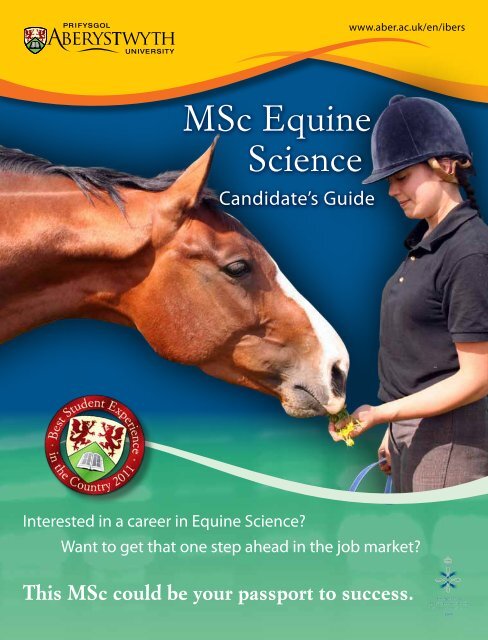
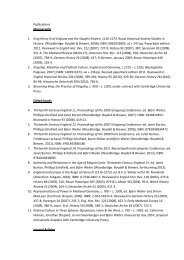
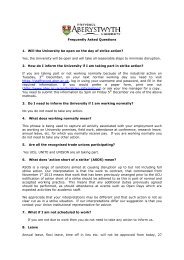

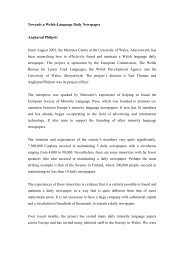
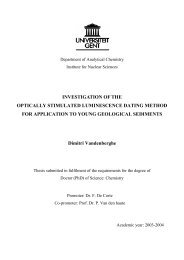
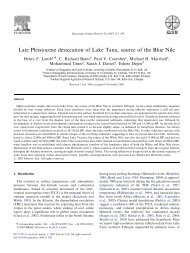
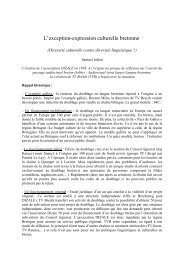
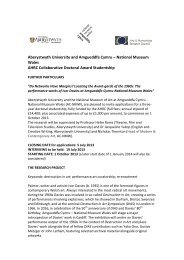
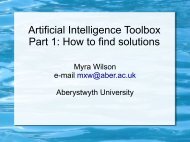

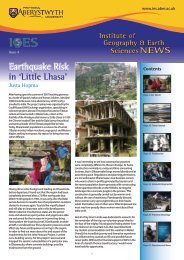
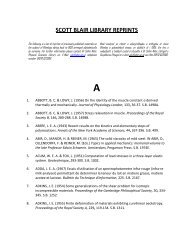
![[pdf] the council - Aberystwyth University](https://img.yumpu.com/8200062/1/184x260/pdf-the-council-aberystwyth-university.jpg?quality=85)
